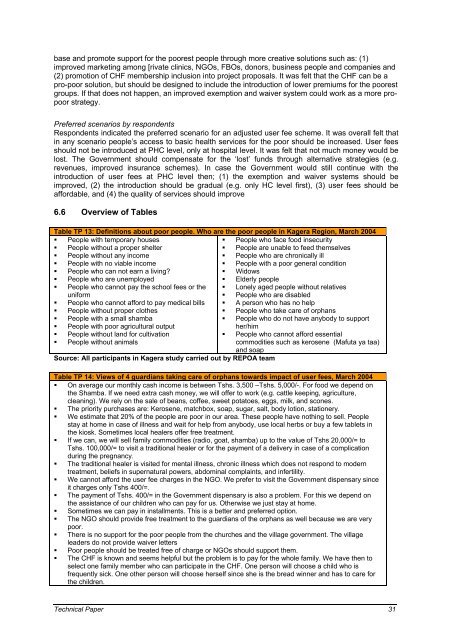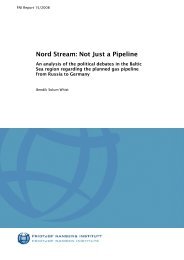equity implications of health sector user fees in tanzania
equity implications of health sector user fees in tanzania
equity implications of health sector user fees in tanzania
Create successful ePaper yourself
Turn your PDF publications into a flip-book with our unique Google optimized e-Paper software.
ase and promote support for the poorest people through more creative solutions such as: (1)<br />
improved market<strong>in</strong>g among [rivate cl<strong>in</strong>ics, NGOs, FBOs, donors, bus<strong>in</strong>ess people and companies and<br />
(2) promotion <strong>of</strong> CHF membership <strong>in</strong>clusion <strong>in</strong>to project proposals. It was felt that the CHF can be a<br />
pro-poor solution, but should be designed to <strong>in</strong>clude the <strong>in</strong>troduction <strong>of</strong> lower premiums for the poorest<br />
groups. If that does not happen, an improved exemption and waiver system could work as a more propoor<br />
strategy.<br />
Preferred scenarios by respondents<br />
Respondents <strong>in</strong>dicated the preferred scenario for an adjusted <strong>user</strong> fee scheme. It was overall felt that<br />
<strong>in</strong> any scenario people’s access to basic <strong>health</strong> services for the poor should be <strong>in</strong>creased. User <strong>fees</strong><br />
should not be <strong>in</strong>troduced at PHC level, only at hospital level. It was felt that not much money would be<br />
lost. The Government should compensate for the ‘lost’ funds through alternative strategies (e.g.<br />
revenues, improved <strong>in</strong>surance schemes). In case the Government would still cont<strong>in</strong>ue with the<br />
<strong>in</strong>troduction <strong>of</strong> <strong>user</strong> <strong>fees</strong> at PHC level then; (1) the exemption and waiver systems should be<br />
improved, (2) the <strong>in</strong>troduction should be gradual (e.g. only HC level first), (3) <strong>user</strong> <strong>fees</strong> should be<br />
affordable, and (4) the quality <strong>of</strong> services should improve<br />
6.6 Overview <strong>of</strong> Tables<br />
Table TP 13: Def<strong>in</strong>itions about poor people. Who are the poor people <strong>in</strong> Kagera Region, March 2004<br />
� People with temporary houses<br />
� People without a proper shelter<br />
� People without any <strong>in</strong>come<br />
� People with no viable <strong>in</strong>come<br />
� People who can not earn a liv<strong>in</strong>g?<br />
� People who are unemployed<br />
� People who cannot pay the school <strong>fees</strong> or the<br />
uniform<br />
� People who cannot afford to pay medical bills<br />
� People without proper clothes<br />
� People with a small shamba<br />
� People with poor agricultural output<br />
� People without land for cultivation<br />
� People without animals<br />
Source: All participants <strong>in</strong> Kagera study carried out by REPOA team<br />
� People who face food <strong>in</strong>security<br />
� People are unable to feed themselves<br />
� People who are chronically ill<br />
� People with a poor general condition<br />
� Widows<br />
� Elderly people<br />
� Lonely aged people without relatives<br />
� People who are disabled<br />
� A person who has no help<br />
� People who take care <strong>of</strong> orphans<br />
� People who do not have anybody to support<br />
her/him<br />
� People who cannot afford essential<br />
commodities such as kerosene (Mafuta ya taa)<br />
and soap<br />
Table TP 14: Views <strong>of</strong> 4 guardians tak<strong>in</strong>g care <strong>of</strong> orphans towards impact <strong>of</strong> <strong>user</strong> <strong>fees</strong>, March 2004<br />
� On average our monthly cash <strong>in</strong>come is between Tshs. 3,500 –Tshs. 5,000/-. For food we depend on<br />
the Shamba. If we need extra cash money, we will <strong>of</strong>fer to work (e.g. cattle keep<strong>in</strong>g, agriculture,<br />
clean<strong>in</strong>g). We rely on the sale <strong>of</strong> beans, c<strong>of</strong>fee, sweet potatoes, eggs, milk, and scones.<br />
� The priority purchases are: Kerosene, matchbox, soap, sugar, salt, body lotion, stationery.<br />
� We estimate that 20% <strong>of</strong> the people are poor <strong>in</strong> our area. These people have noth<strong>in</strong>g to sell. People<br />
stay at home <strong>in</strong> case <strong>of</strong> illness and wait for help from anybody, use local herbs or buy a few tablets <strong>in</strong><br />
the kiosk. Sometimes local healers <strong>of</strong>fer free treatment.<br />
� If we can, we will sell family commodities (radio, goat, shamba) up to the value <strong>of</strong> Tshs 20,000/= to<br />
Tshs. 100,000/= to visit a traditional healer or for the payment <strong>of</strong> a delivery <strong>in</strong> case <strong>of</strong> a complication<br />
dur<strong>in</strong>g the pregnancy.<br />
� The traditional healer is visited for mental illness, chronic illness which does not respond to modern<br />
treatment, beliefs <strong>in</strong> supernatural powers, abdom<strong>in</strong>al compla<strong>in</strong>ts, and <strong>in</strong>fertility.<br />
� We cannot afford the <strong>user</strong> fee charges <strong>in</strong> the NGO. We prefer to visit the Government dispensary s<strong>in</strong>ce<br />
it charges only Tshs 400/=.<br />
� The payment <strong>of</strong> Tshs. 400/= <strong>in</strong> the Government dispensary is also a problem. For this we depend on<br />
the assistance <strong>of</strong> our children who can pay for us. Otherwise we just stay at home.<br />
� Sometimes we can pay <strong>in</strong> <strong>in</strong>stallments. This is a better and preferred option.<br />
� The NGO should provide free treatment to the guardians <strong>of</strong> the orphans as well because we are very<br />
poor.<br />
� There is no support for the poor people from the churches and the village government. The village<br />
leaders do not provide waiver letters<br />
� Poor people should be treated free <strong>of</strong> charge or NGOs should support them.<br />
� The CHF is known and seems helpful but the problem is to pay for the whole family. We have then to<br />
select one family member who can participate <strong>in</strong> the CHF. One person will choose a child who is<br />
frequently sick. One other person will choose herself s<strong>in</strong>ce she is the bread w<strong>in</strong>ner and has to care for<br />
the children.<br />
Technical Paper 31













